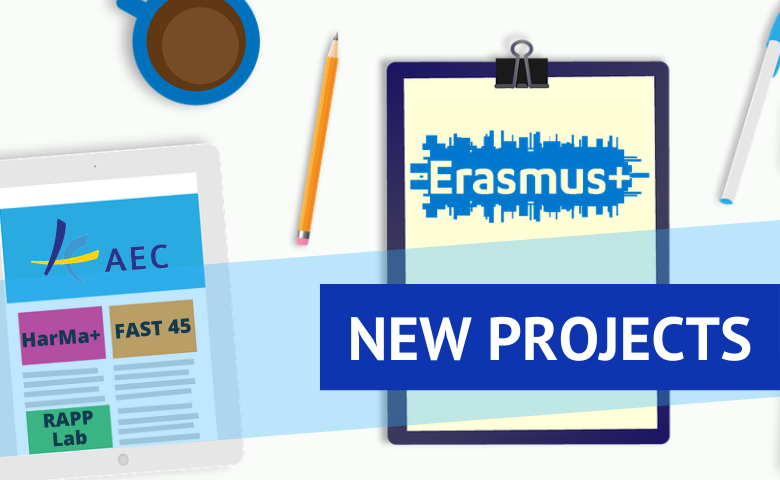During the past few weeks, step by step the results of the Call 2020 round of applications for funding programs granted by the European Commission have been announced. Although individual decisions were still pending at the time of going to press, it is already now obvious that the clear majority of those project applications in which the AEC was involved in the preparation process and as a partner will actually be granted.
We have decided to present these projects one by one in this and future newsletters, starting with three applications submitted under Erasmus+. Although quite diverse in terms of content and methods to be used, all three projects look very promising to provide inspiring and innovative impulses how to further develop the Music Higher Education sector. Two of them are Key Action 2 applications (Cooperation for innovation and the exchange of good practices), one is a transdisciplinary project from the Knowledge Alliances strand. All three projects will start in autumn this year and have a 3-years term. Once again, the focus of AEC's contribution is on disseminating the projects' progress and outcomes, even if this happens in different ways in each individual case.
HarMa+ (European Landscape of Teaching Practices and Pedagogical Innovation in HMEI's – Music Theory Fields)
This project created by Salvatore Gioveni promotes cross-border collaboration in the field of Music Theory through sharing knowledge and transferring pedagogical innovation. It thus responds to a lack of centralised source and framework to deepen reflection by means of cross-disciplinary study at European and international level.
There is a significant wealth of educational practices from one country to another in this sector, especially in terms of harmonic musical notation and analysis. However, Music Higher Education Institutions (HEIs) are facing the nonexistence of a European network for pedagogical staff in Music Theory so far. To improve the situation, the project will among other things develop online platforms, an EU bibliography, multilingual catalogues on a subject specific methodology and terminology.
Besides the Conservatoire Royal de Bruxelles as leader of the project, the following partner institutions are involved: Music Academy S. Moniuszki Gdańsk (Poland), F. Liszt Academy of Music Budapest (Hungary), Estonian Academy for Music and Theatre (Tallinn, Estonia), HfMTh „Felix Mendelssohn Bartholdy“ Leipzig (Germany).
RAPP Lab (Reflection-based Artistic Professional Practice)
RAPP Lab will bring together advanced music students (MA / PhD) to jointly work in a number of Artistic Research Labs covering a range of diverse thematic and methodical approaches. Participants will thus be equipped with tools for deepening their own artistic practice against the background of reflective and research-based methods. The project's objective is to open up new pathways to the students enabling them to find innovative and self-determined ways of artistic expression and at the same time improve their opportunities on the job market.
The project is interdisciplinary and intended to end up in the implementation of reflection-based interdisciplinary curricular elements. RAPP Lab was initiated by Cologne University of Music and Dance which is also leading the project. Other project partners are the Norwegian Academy of Music Oslo, the University of Music and Performing Arts Vienna (Mdw Vienna), the Estonian Academy for Music and Theater in Tallinn, the Orpheus Institute Ghent and the Conservatoire Santa Cecilia Rome.
The collaboration among the partners will be based on a joint digital platform, but it is supplemented by physical meetings in workshops and summer schools lasting several days each.
FAST 45 (Erasmus+ Knowledge Alliance Future Art School Trends 2045)
The urge for innovation together with the need for creativity in current and future society brought together key players from Higher Art Education Institutes and Networks, Creative Industry, and Business. Initiated and chaired by the Brussels-based LUCA School of Arts, the consortium includes 6 Arts HEIs from all art disciplines, including CEFEDEM Lyon as the representative of music field, but also small and big enterprises such as Microsoft Ireland. ELIA and AEC are in charge of spreading the project ideas among the Higher Art Education community. FAST45-partners will aim to imagine a desirable future in which the participation, research, and education in the arts are playing a more important and integrated role. Knowing that the world in 2045 will have been radically reshaped by many challenges, FAST45 collects knowledge, creates and tests methods for futures thinking, and broadly implements them in cross disciplinary labs. These FAST45-labs will facilitate students, educators, researchers, and employers in creative industry and business to discuss possible futures for art employment and higher art education.






